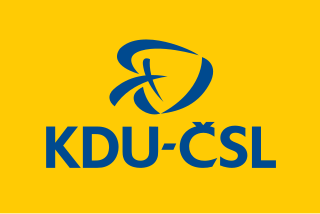
Social Democracy, known as the Czech Social Democratic Party until 10 June 2023, is a social-democratic political party in the Czech Republic. Sitting on the centre-left of the political spectrum and holding pro-European views, it is a member of the Party of European Socialists, the Socialist International, and the Progressive Alliance. Masaryk Democratic Academy is the party-affiliated's think tank.

KDU-ČSL, often shortened to lidovci, is a Christian-democratic political party in the Czech Republic. The party has taken part in almost every Czech government since 1990. In the June 2006 legislative election, the party won 7.2% of the vote and 13 out of 200 seats; but in the 2010 election, its vote share dropped to 4.4% and they lost all of its seats. The party regained its parliamentary standing in the 2013 legislative election, winning 14 seats in the new parliament, thereby becoming the first party ever to return to the Chamber of Deputies after previously dropping out.

The Civic Democratic Party is a conservative and Eurosceptic political party in the Czech Republic. The party sits centre-right on the political spectrum, and holds 34 seats in the Chamber of Deputies, and is the second strongest party by number of seats following the 2021 election. It is the only political party in the Czech Republic that has maintained an uninterrupted representation in the Chamber of Deputies.

The Czech National Socialist Party, abbreviated to ČSNS 2005, was a centre-left nationalist political party in the Czech Republic. Founded in 2005 by members of the Czech National Social Party because of financial problems of that party, ČSNS 2005 was committed to the heritage of the First Republic Czechoslovak National Socialist Party, party of Edvard Beneš or Milada Horáková. The Czech National Socialist Party was a Eurosceptic party and cooperated with the alliance Sovereignty – Jana Bobošíková Bloc.

Czech National Social Party is a civic nationalist political party in the Czech Republic, that once played an important role in Czechoslovakia during the interwar period. It was established in 1897 by break-away groups from both the national liberal Young Czech Party and the Czech Social Democratic Party, with a stress on achieving independence of the Czech lands from Austria-Hungary. Its variant of socialism was moderate and reformist rather than a Marxist one. After the National Labour Party dissolved and merged with National Socialists in 1930, the party also became the refuge for Czech liberals. Its best-known member was Edvard Beneš, a co-founder of Czechoslovakia and the country's second President during the 1930s and 1940s.
This article gives an overview of liberalism in Croatia. Liberals became active since 1860 in Dalmatia and since 1904 in the rest of Croatia. It never became a major political party. It is limited to liberal parties with substantial support, mainly proved by having had a representation in parliament. The sign ⇒ denotes another party in that scheme. For inclusion in this scheme it isn't necessary so that parties labeled themselves as a liberal party.
This article gives an overview of liberalism and radicalism in Hungary. It is limited to liberal and radical parties with substantial support, mainly proved by having had a representation in parliament. The sign ⇒ denotes another party in that scheme. For inclusion in this scheme it is not necessary that parties labeled themselves as a liberal party.
Liberalism in Serbia is limited to liberal parties with substantial support, mainly proved by having had a representation in parliament. The sign ⇒ denotes another party in that scheme. For inclusion in this scheme it is not necessary so that parties labeled themselves as a liberal party.

Roma Democratic Social Party is a small Czech political party founded on 22 March 2005 and led by Miroslav Tancoš. It seeks to improve the social and economic condition of the Romani.

The Party for the Open Society is a minor social liberal political party in the Czech Republic.

The Civic Movement was a liberal political party based in the Czech Republic, which existed from 1991 to 1995. The party was established after the break-up of Civic Forum by the liberal wing of Civic Forum, while the conservative wing established the Civic Democratic Party. Foreign Minister Jiří Dienstbier was elected leader of the Civic Movement. The party participated in the 1992 legislative election but failed to reach the required 5% threshold and was left without parliamentary representation.

The Czechoslovak National Democracy, called also Czechoslovak National Democratic Party, was a First Republic right-wing political party in Czechoslovakia.

The German Social Democratic Workers' Party in the Czechoslovak Republic was a German social democratic party in Czechoslovakia, founded when the Bohemian provincial organization of the Social Democratic Workers' Party of Austria separated itself from the mother party. The founding convention was held in Teplice from 30 August – 3 September 1919; the first leader of the party was Josef Seliger.
The Independent Socialist Party was a political party in Czechoslovakia. The party was founded in March 1923. The party included a number of former anarchists, who had joined the Czech Socialist Party in 1918. They had however been expelled from the Czechoslovak Socialist Party in 1923, as they opposed the Defense of the Republic Act. In the Czechoslovak National Assembly, the Independent Socialists formed a joint parliamentary group together with the Independent Radical Social Democratic Party of V. Brodecký. The two groups were set to merge, but Brodecký's group decided to merge with the Czechoslovak Social Democratic Workers Party. The Independent Socialist Party took the name Independent Socialist Workers Party at a congress in June 1924.
The Provincial Christian-Socialist Party was the main political party of ethnic Hungarians in the First Czechoslovak Republic.
Růžena Krásná was a Czech liberal politician and human rights advocate, who was a political prisoner under the Communist regime in Czechoslovakia for eleven years. After World War II, she became regional secretary of the Czech National Social Party in Liberec. Arrested in 1949 by the Soviet occupiers, she was sentenced to death in a public show trial together with MP Emil Weiland. However, the sentence was commuted to life imprisonment and she remained a political prisoner until 1960. After the Velvet Revolution in 1989, she co-founded the Czechoslovak Confederation of Political Prisoners. In 1990, she was elected Chairman of the National Social Party – the Czechoslovak National Socialist Party. She is a founding signatory of the Prague Declaration on European Conscience and Communism.
The Liberal Democratic Party, originally known as the Czechoslovak Democratic Initiative, was a Czechoslovak liberal political party formed on 31 January 1990, shortly after the Velvet Revolution, by Emanuel Mandler and his political group, inspired by the political ideas of Tomas Garrigue Masaryk.

Young Civic Democrats is a political platform within the Civic Democratic Party. It consists of young people. It is considered a competitor to the Young Conservatives. It had 2,000 members in January 2018 making it the largest youth wing in the Czech Republic. Its members are also members of the Civic Democratic Party.











